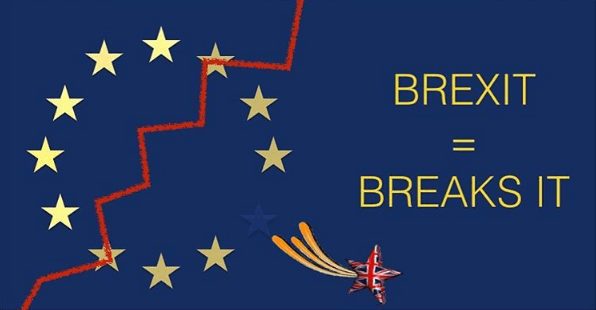 After the surprising BREXIT vote by the people of the United Kingdom last Thursday, we have since certainly all been involved in heated debates regarding this topic. Amongst my Parisian friends, the conversation kept coming back to the English. And like in the “Journal du Dimanche”, the first two pages of a dedicated BREXIT segment were entirely focused on the UK — and had more of a punitive tone.
After the surprising BREXIT vote by the people of the United Kingdom last Thursday, we have since certainly all been involved in heated debates regarding this topic. Amongst my Parisian friends, the conversation kept coming back to the English. And like in the “Journal du Dimanche”, the first two pages of a dedicated BREXIT segment were entirely focused on the UK — and had more of a punitive tone.
The reactions on the continent have revolved around: the British are going to suffer; they are crazy; they do not understand the consequences; they are racist … But, I think, in these expressions, Europeans are mistaken in their conclusion. It would be better not to act as a jilted lover.
I personally feel more European than French (naturalised citizen). And, I think that Europe has a unique opportunity in this moment and must act resolutely.
Another friend opined that she was scared of what it meant. Here, I want to say that we need to move from fear into action.
In this context, I felt the urge to pen my point of view.
My advice to pro-Europeans: do not focus on the UK and the impact on them. Certainly, the reasons that motivated the vote are distressing; certainly, the UK may see the pound weakened and their economy struggle … but the real issue is:
What to make of Europe?
As the Chinese* would say: in any crisis, there is danger and opportunity. The requirement on the European side is not to draw up the best retribution possible against the Brits, but instead to focus its energies to find its own way and take care of itself. Angela Merkel rightly said: “Do not make fast conclusions about the British decision…”
Europe needs to understand – in a deeper way – why the Brexit vote happened. Sure, it was the 50+ year-old lesser educated English person who voted LEAVE in a bid to restore British sovereignty. But, in reality, the problem is that the British have not found enough reason to belong to Europe. Nicolas Sarkozy, for whatever he may be worth, is right in saying, “The British are gone: it’s their choice. We must now act fast and strong.” (JDD p6).
The risks
The three biggest risks BREXIT poses for Europe are:
- A wave of nationalism takes over Europe (e.g. France, Austria, the Netherlands…), driven by fear of immigration and a need to regain lost national pride. We should keep a beady eye on the presidential elections in France and Germany next year. And one should not forget the risk (and the need for a robust response by Europe and the US) of the resurgent near-despotic Russian nationalism.
- The European economy does not reboot, leaving an unhealthy level of unemployment, the younger generations in a precarious position and a stagnant intra-European movement of population. Note: the destabilizing effects of a non-harmonized tax system and uncoordinated state expenditures render the Euro currency totally flawed.
- That the people in European countries feel increasingly trapped in a Europe in which they do not recognize themselves; and, do not find a net benefit versus the apparent cost. So we’re bound to see other European countries embark on their own EXIT. We are already talking about similar votes in several countries. This all points to the fact that a strong anti-European sentiment existed well before the vote in the UK.
The stakes are high and the risks are real. But, it is important to stress that they existed before the BREXIT vote. In fact, these topics were fully discussed before; but, the 28 members at the table were nowhere near finding a solution, stuck in endemic bureaucracy and consensual decision-making. The problem is that nobody (in Brussels, in particular) has ever felt enough urgency. It’s like running a business with an over-populated Executive Committee. An ExCom of 28 27 people is just unmanageable.
The Opportunities
The opportunities for Europe – or even unintended consequences – are:
- To define the vision (aka its NORTH) of Europe, something that could be made easier without the presence and the nit-picky point of view of the English. Firstly, one would have to imagine a future in which Europe has a definite place in the world, and with which members can identify themselves. Secondly, we should agree on the de facto shared values. To date, neither the vision nor the common values are clear.

The Ideal House by Claude Nicolas Ledoux, 1770
- To address how to mobilize the European economy from the inside – instead of focusing how to repulse or ensnare the new entrants (e.g. Google, Facebook and Alibaba); to encourage entrepreneurship and the free movement of people between countries; and to collaborate on strategic projects (not just Airbus). N.B. High taxation and bureaucracy are not favorable conditions for business.
- With a well-defined North, Brussels must be prepared and able to make tough decisions. For example: to clean Europe of members who do not play by the rules. Consensus – as a process – is not friendly with making difficult decisions.
- Not forgetting that if Europe acts appropriately, Scotland and Northern Ireland could decide to join the EU …
In the vision of the Europe of tomorrow, there is a need to identify one or more values that are held in common.* This must be an ideal and/or a behavioural trait that is shared de facto by the people living there. Europe needs to take decisive and joint action that demonstrates a clear ambition and that unites. One would need to streamline the decision-making in Brussels to become fleeter of foot. Will there ever be an alignment of tax policies and, even more complicated, over the role of the state (e.g., level of expenditures) within each country?
REDEFINING EUROPE
Although many repudiate the idea, Europe would perhaps need a real orchestral conductor. Is there an appetite on the part of citizens (and their governments) to give up more power and sovereignty to a meta-structure, with a European president? But, even imagining it were accepted, would there be a person up to the task? Angela Merkel would present the best (only?) option.
Many questions and concerns. But these issues should have been debated and resolved much earlier. Now, it’s time to take the bull by the horns.
WHAT IF BREXIT WERE THE RIGHT DECISION … FOR EUROPE?

If, as a result of the UK’s decision, Europe undertakes radical changes that will ensure the future of Europe, BREXIT would have had a happy unexpected intention: Europe will have received the necessary kick in the butt to provoke the change. But, if Europe implodes, this would indicate that the UK had good reason to withdraw. Perhaps, the UK’s departure will be the straw that breaks the camel’s back, but, in my opinion, the proverbial camel was already heavily overloaded.
Either way, I maintain that Brexiting was the right decision, even if the reasoning that underpinned this vote were unfortunate.
As a first (small) act of the new Europe: At the time of Euro 2016, I would propose to create a European team for each sport (not just golf)!
Europe: Now’s the time for us to act together!
* Although the United States are far from exemplary on many points, there exists a common shared value – across the 50 states – a fundamental belief: every individual has the right to build his/her own future. This kind of shared value binds and transcends all the American people. May the EU find its own!
*My friend, Takuya san, pointed out that the ideogram I had originally posted was wrong (it meant “storm wind”). So, I have replaced it with the correct characters! Arigato Takuya san!













Such an interesting post Minter. We are all in shock at the moment (including those of us, like myself and Hugo, who voted to Leave). The current state of affairs has sought out the worst in many people and I think it is hard, even for politicians (or perhaps especially for them) to focus on the bigger picture as you are. There will be turmoil for a while but my personal hope is that other countries will follow our lead and that the European Community can press the restart button, giving the participants a chance to create a meaningful entity that works in a way (a democratic way) we can all endorse. Thanks for your blogpost!
Thanks for your comment Amanda.
We probably have not seen the end of the unintended consequences… Not forgetting what might happen in Scotland and NI…
Very interesting. I believe a good Thing often comes out of a bad one.
Thank you Minter
Question of [the right] attitude Ghislaine! 🙂
A huge blow on the “bobo” liberal community who even contemplate to annul the vote. The media too self centered forgot the underwaves of a new social current that needs more than global trade. European values that are sold to the highest bidder, no thanks, a vision has meaning beyond business.
And “meaning” is rather emotional as we have seen over and over again.